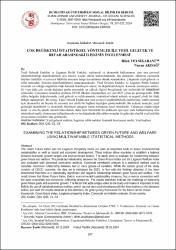| dc.contributor.author | Veysikarani, Dilek | |
| dc.contributor.author | Akdağ, Nuran | |
| dc.date.accessioned | 2024-04-28T21:44:42Z | |
| dc.date.available | 2024-04-28T21:44:42Z | |
| dc.date.issued | 2024 | en_US |
| dc.identifier.issn | 2587-005X | |
| dc.identifier.uri | https://hdl.handle.net/11363/7291 | |
| dc.description.abstract | Yeşil Gelecek Endeksi ve Legatum Refah Endeksi, toplumsal ve ekonomik kalkınmanın yanı sıra çevresel
sürdürülebilirliği değerlendirmek için önemli araçlar olarak kullanılmaktadır. Bu endeksler, ülkelerin ekonomik
büyüme hedefleri ve çevresel faktörler arasında denge kurmalarına olanak sunmaktadır. Çalışmada yeşil gelecek ve
refah arasındaki ilişkinin değerlendirilmesi amaçlanmaktadır. Yeşil Gelecek Endeksi ve Legatum Refah Endeksi
arasında var olduğu öngörülen ilişki kanonik korelasyon analizi ile değerlendirilmiştir. Kanonik korelasyon analizi,
iki veya daha çok sayıda değişken grubu arasındaki en yüksek ilişkiyi hesaplamak için kullanılan bir istatistiksel
yöntemdir. Çalışmanın örneklem grubunu OECD ülkeleri oluştururken veri seti 2023 yılına ait göstergelerdir. Elde
edilen bulgular doğrultusunda, yeşil gelecek ve refah arasında istatistiksel olarak anlamlı ve negatif yönlü bir ilişki
olduğu saptanmıştır. Bu sonuç, Yeşil Gelecek Endeksinin yani çevresel sürdürülebilirlik ölçütlerinin, refahı yansıtan
açık ekonomiler alt boyutu ile arasında ters yönlü bir bağlantı taşıdığını göstermektedir. Bu nedenle sonuçlar, yeşil
geleceğin hedeflerini ve ekonomik büyümeyi dengede tutma zorluğunu işaret etmektedir. Çalışmaya özgün değer
katan ve onu bu alanda önemli kılan faktör, daha önce literatürde bu endeksler için aynı anda kullanılmamış olan
istatistiksel analiz yönteminin kullanılmasıdır ve bu doğrultuda elde edilen sonuçlar ile geleceğe yönelik yeşil politika
çerçevesinin çizilebilir hale gelmesidir. | en_US |
| dc.description.abstract | The Green Future Index and the Legatum Prosperity Index are used as important tools to assess environmental
sustainability as well as social and economic development. These indices allow countries to establish a balance
between economic growth targets and environmental factors. The study aims to evaluate the relationship between
green future and welfare. The predicted relationship between the Green Future Index and the Legatum Welfare Index
was evaluated with canonical correlation analysis. Canonical correlation analysis is a statistical method used to
calculate maximum relationship between two or more groups of variables. While the sample group of the study
consists of OECD countries, the data set is indicators for 2023. In line with the findings obtained, it has been
determined that there is a statistically significant and negative relationship between green future and welfare. This
result shows that Green Future Index, that is, environmental sustainability measures, has a reverse connection with
the open economies sub-dimension reflecting prosperity. The results therefore indicate the challenge of balancing
green future goals and economic growth. The factor that adds unique value to the study and makes it important in this
field is the use of statistical analysis method, which has not been used simultaneously for these indices in the literature
before, and with the results obtained in this direction, the green policy framework for the future can be drawn. | en_US |
| dc.language.iso | tur | en_US |
| dc.publisher | Dumlupınar Üniversitesi | en_US |
| dc.relation.isversionof | 10.51290/dpusbe.1385528 | en_US |
| dc.rights | info:eu-repo/semantics/openAccess | en_US |
| dc.subject | Yeşil gelecek endeksi | en_US |
| dc.subject | Legatum refah endeksi | en_US |
| dc.subject | Kanonik korelasyon analiz | en_US |
| dc.subject | Yeşil toplum | en_US |
| dc.subject | Green future index | en_US |
| dc.subject | Legatum prosperity index | en_US |
| dc.subject | Canonical corrrelation analysis | en_US |
| dc.subject | Green society | en_US |
| dc.title | Çok Değişkenli İstatistiksel Yöntemler ile Yeşil Gelecek ve Refah Arasındaki İlişkinin İncelenmesi | en_US |
| dc.title.alternative | Examining The Relationship Between Green Future and Welfare Using Multivariable Statistical Methods | en_US |
| dc.type | article | en_US |
| dc.relation.ispartof | Dumlupınar Üniversitesi Sosyal Bilimler Dergisi | en_US |
| dc.department | Uygulamalı Bilimler Fakültesi | en_US |
| dc.authorid | 0000-0001-8071-0720 | en_US |
| dc.authorid | 0000-0002-9204-5606 | en_US |
| dc.identifier.issue | 79 | en_US |
| dc.identifier.startpage | 207 | en_US |
| dc.identifier.endpage | 221 | en_US |
| dc.relation.publicationcategory | Makale - Ulusal Hakemli Dergi - Kurum Öğretim Elemanı | en_US |
| dc.contributor.institutionauthor | Akdağ, Nuran | |

















